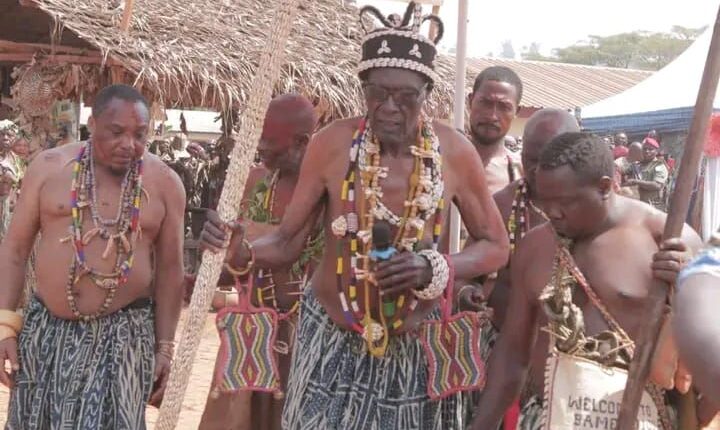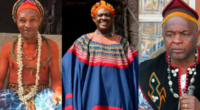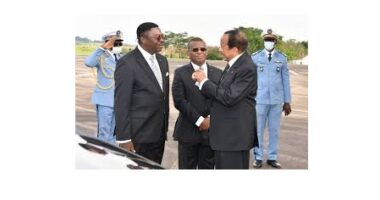Fo’o Sokoudjou Stands Tall: A Lone Voice of Courage Amid a Chorus of Capitulation to Biya’s Regime
By Andre Momo
In the heart of Cameroon’s West Region, a beacon of integrity has emerged to challenge the creeping shadow of political subservience. Fo’o Sokoudjou Mpoda, the revered traditional ruler of Bamendjou, has taken a defiant stand against his peers’ shameless display of loyalty to President Paul Biya’s 43-year regime. While other traditional rulers from the West Region flocked to Etoudi Palace in a choreographed show of support for a government mired in corruption and oppression, Fo’o Sokoudjou’s absence spoke louder than their presence. His bold rebuke of his fellow leaders and the regime they prop up is a clarion call for Cameroonians to reject complicity and reclaim their dignity.
Fo’o Sokoudjou’s statement, delivered with the gravitas of a true guardian of tradition, lays bare the betrayal of those who attended the Etoudi meeting. “I was unaware of the meeting,” he declared, distancing himself from what many see as a staged pledge of allegiance to a regime desperate to cling to power as elections loom. His words cut deeper as he accused his peers of abandoning “the legacy of their forefathers and the missions entrusted to them.” This is no mere critique—it’s a damning indictment of traditional rulers who have traded their sacred roles as custodians of culture and community for a seat at Biya’s table.
Let us praise Fo’o Sokoudjou, a leader whose moral compass remains unshaken in a nation where power too often buys silence. His refusal to join the Etoudi pilgrimage is not just an act of defiance but a powerful reminder of what traditional leadership should be: a voice for the people, not a mouthpiece for a regime that has plundered Cameroon for over four decades. In Bamendjou, Fo’o Sokoudjou has stood firm, embodying the ancestral wisdom and courage that his peers have forsaken. His call for leaders to “speak only for themselves” is a direct challenge to the collective sycophancy that threatens to erode the trust communities place in their traditional rulers.
Contrast this with the shameful spectacle of the other West Region rulers, who, by their presence at Etoudi, lent their titles to a regime synonymous with repression, electoral fraud, and the marginalization of entire regions, particularly the Anglophone Northwest and Southwest. These leaders, entrusted with the sacred duty to protect and represent their people, have instead chosen to bow before a government that deploys security forces to crush dissent and starves communities of development. Their attendance at Etoudi, whether coerced or voluntary, signals a betrayal of the very legacy Fo’o Sokoudjou invokes—a legacy of resistance against exploitation, rooted in the sacrifices of their forefathers who fought colonial powers, not kowtowed to them.
And at the heart of this charade sits President Paul Biya’s regime, orchestrating these meetings with the precision of a dictator clinging to legitimacy. For 43 years, Biya’s government has ruled with an iron fist, rigging elections, silencing critics, and fueling crises like the Anglophone conflict that has left thousands dead and displaced. These Etoudi summits—whether with traditional rulers, Fons, Imams, or bishops—are not dialogues but desperate attempts to manufacture consent. By summoning opinion leaders, the regime hopes to parade their endorsements as proof of national unity, all while ignoring the cries of a populace suffocating under economic despair and political exclusion. It’s a tired playbook, and Fo’o Sokoudjou’s refusal to play along exposes its fragility.
The timing of these meetings, as Fo’o Sokoudjou’s critique implies, is no coincidence. With elections on the horizon, the regime is scrambling to secure loyalty from influencers who can sway their communities. But what moral authority do these leaders have left when they align with a government that has failed to deliver justice, peace, or prosperity? The people of the West Region, like those across Cameroon, are not blind. They see the contrast between Fo’o Sokoudjou’s principled stand and the acquiescence of others who claim to represent them. The question now is whether these other rulers will heed his call to speak for themselves—or continue to lend their voices to a regime that history will judge as a betrayal of Cameroon’s soul.
Fo’o Sokoudjou’s courage is a spark in the darkness, a reminder that leadership is not about proximity to power but fidelity to principle. As Cameroon teeters on the edge of another electoral farce, his example must inspire us all—citizens, leaders, and institutions—to reject the lure of Etoudi’s gilded promises. The legacy of our forefathers demands nothing less. To the other traditional rulers: redeem yourselves. To Biya’s regime: your time is running out. And to Fo’o Sokoudjou: thank you for showing us what it means to stand tall.





